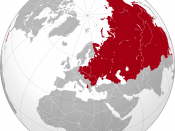To take the perspective of the traditionalist historian in placing the blame of origin of the Cold War solely upon the Soviet Union is orthodox and somewhat reasonable if only one frame, out of the context of long decades of conflict, is examined. But before critics quickly sway to the extreme of siding with US Naval War historian Eugene V Rostow in claiming, "The cold war was caused by the USSR's 'imperial appetite'", it is crucial to understand why revisionists like the celebrated William A. Williams would argue the opposite. Soviet policies between 1945 and 1949 did play an essential role to the build up and outbreak of the tension between the USSR and USA, but not to the extent of how much the US is responsible for, because of post-war political arrangements, US initiative in the shut-down of diplomacy and the cause of the Berlin Blockade.
Soviet's political policies during the post WWII negotiations as seen in Yalta (February 1945) and Potsdam (July 1945) were relatively simple to grasp, because they focused on the establishment of a firm buffer zone as an impediment to future invasion.
On a whole, the USSR's demands are justified because of their long estranged past from the west and the numerous invasions and betrayals that the allied countries had committed (i.e. the Bolsheviks Revolution, delay of a second front, two successive incursions from Germany, etc.). The Soviet's hopes for claiming territory, inheriting colonies and gaining access to warm seaports are as 'imperial' as the allies' seeming prerogative of having practiced the same for centuries on end (i.e. the British and the French). Complaints regarding the USSR's ability to take reparations from the Soviet Zone and also 10% of the industrial equipment of the western zones as reparations are vindicated as well, since America...


